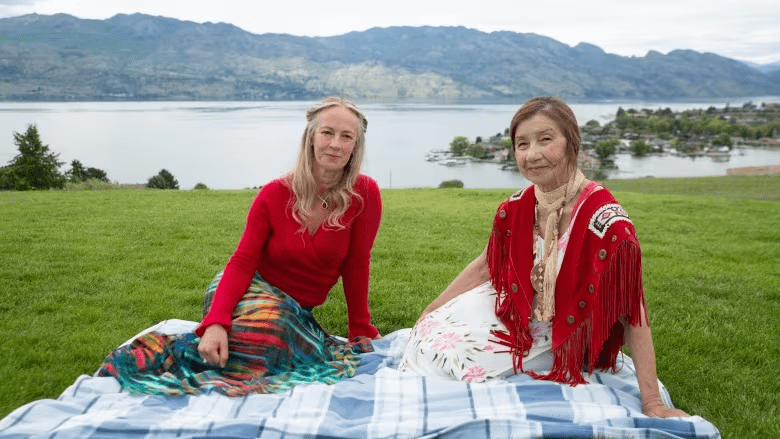
Heather Pawsey and Delphine Derickson photographed by Maggie MacPherson on the shores of Okanagan Lake.
Renowned soprano Heather Pawsey stumbled upon a hidden gem in the world of classical music during her exploration of the Canadian Music Centre library in Vancouver – a forgotten opera titled "The Lake," composed in 1952 by the trailblazing Barbara Pentland. Pentland, a notable figure in Canada's musical history, defied norms by composing classical music during an era when women faced skepticism as serious composers.
"The Lake" marked Pentland's only foray into opera, a significant undertaking in the realm of classical music. However, despite her efforts, the group that initially commissioned the opera disbanded before its performance, consigning this masterpiece to the shelves of the Canadian Music Centre.
Heather Pawsey, impressed by Pentland's contribution to Canadian music, decided to breathe life into "The Lake" in collaboration with Syilx educator Delphine Derickson. The captivating journey of their collaboration, along with the opera's revival, is vividly portrayed in the documentary "The Lake / nx̌aʔx̌aʔitkʷ," scheduled for its television debut on December 14.
Pawsey and Derickson's paths first crossed in 2012 when Pawsey presented a stripped-down, "in concert" performance of "The Lake" in Vancouver. Recognizing the need to gauge the opera's potential for a full-scale production, Pawsey and Derickson embarked on a transformative journey, leading to a unique collaboration that would reshape Pentland's work.
The original opera narrates the tale of Susan Allison, one of the early European settlers in the Okanagan, and her encounter with nx̌aʔx̌aʔitkʷ, the sacred serpent creature residing in Okanagan Lake, often referred to as Ogopogo. Derickson, hailing from Westbank First Nation, attended the initial performance, unaware that the opera unfolded in her homeland. Despite appreciating Pawsey's singing, Derickson found aspects of the narrative problematic and initiated a backstage conversation.
"I really enjoyed listening until I heard some of the words like 'A naked Indian sitting in a teepee, because he gambled away his clothing,'" recounts Derickson. Her candid discussion with Pawsey led to a plan to indigenize the opera, preserving its essence while incorporating indigenous perspectives. The only alteration was the correction of the pronunciation of nx̌aʔx̌aʔitkʷ.
Derickson, also a singer, contributed a song in the nsyilxcen language, seamlessly integrated into the opera. Her daughter, Corinne Derickson, added a dance representing nx̌aʔx̌aʔitkʷ. The documentary captures these transformative additions, featuring performances against the backdrop of the Okanagan Valley, including Susan Allison's original cabin, now a winery, and Westbank First Nation territory.
Derickson's suggestion to bring the opera to the Westbank community, rather than Vancouver, materialized in the film, adding a layer of cultural significance. Both Pawsey and Derickson aspire to share their story with a broader audience through the documentary.
Pawsey expresses her desire for global accessibility, stating, "I wanted every person on the planet to have an opportunity to see this; to not have to pay to see it; to not have to travel to a big city to see it." Derickson sees this as an extension of her lifelong commitment to educating the world about the nsyilxcen language and Syilx culture.
As "The Lake / nx̌aʔx̌aʔitkʷ" graces television screens, it unfolds a tale of musical revival, cultural integration, and the enduring power of collaboration to transcend the confines of time and bring forgotten art to new life.















